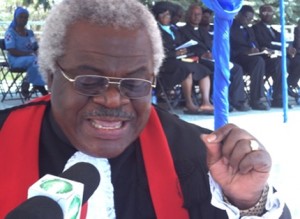Media misconduct could spell doom for press freedom – Rev. Prof. Martey
 The Right Reverend Professor Emmanuel Martey, Moderator of the Presbyterian Church of Ghana, has called for strong ethical and responsible media practice to safeguard national peace and security.
The Right Reverend Professor Emmanuel Martey, Moderator of the Presbyterian Church of Ghana, has called for strong ethical and responsible media practice to safeguard national peace and security.
He said the media’s conduct in recent times had been very worrying, particularly, those that fueled ethnicity and division among various political groups.
He cited a situation where some media practitioners had succumbed to gross unethical behaviours and misconducts to please their political or commercial pay masters, particularly during the election 2012 court petition proceedings.
Prof Martey was speaking on the topic: “Media Ethics and Transparency in Frequency Allocation,” at a National Governance dialogue on Friday, which was organised by the Graphic Communications Group Limited under the STAR Ghana project, a multi donor funded organisation.
He said there must be serious measures in place to prevent media tyranny as the public is currently not very happy with the gross ethical misconducts.
He said: “These could spell doom or become recipes to derail the progress of press freedom, national peace, security and the sound democracy of the country”.
Prof Martey attributed these challenges to the old adage that says that “he, who pays the piper, calls the tune”, saying it is unfortunate that some journalists are quick to sell their conscience and sense of professionalism for gains rather than upholding their integrity to the country.
He urged media practitioners to remain focused on their mandate as the fourth estate and also as watchdogs to the development and progress of both the citizens and the nation as a whole.
He also called for a radical change in behaviour and attitudes of media owners and practitioners to win back the failing public respect and confidence in the media
The Moderator said there is presently various public outcries based on inaccurate reportage, lack of objectivity, analytical touch to issues, as well lack of professionalism on the whole, which had led to the call for the introduction of strict regulations such as the re-introduction of the Criminal Libel Law which was repealed in 2001 among other things to curb the abuses and excesses and to bring some sanity and decency to the media landscape.
This he said, is not a good sign as the role of the media in an active democratic dispensation largely depends on its freedom to operate, likewise quality democracy is dependent on the quality of the media of a country.
The Moderator questioned the media’s present role and effort in effectively sustaining Ghana’s young democracy, saying instead of leading in the conscientisation of the citizenry and educating them on what they really deserved from government and what they are actually getting, the Ghanaian media had allowed itself to be manipulated by politicians because they had chosen to remain passive about issues of true governance and national development just as civil society had been for some time now.
He said there is no doubt that present increases in media outlets, media ownership, as well as the rise in the turnout of practitioners from the various training institutions across the country had been a major contributory factor to the unethical challenges and misconducts facing the profession.
The proliferation of FM and television stations and their misuse for negative political purposes and programmes, by unprofessional hosts who made unethical statements and allowed equal behaviours to pass on through phone-in segments on their shows must be urgently addressed by the National Media Commission and the National Communications Authority.
The Moderator mentioned the Ghana Journalist Association’s Code of Ethics and others such as the Code of conduct of the National Media Commission, which serve as guides for sound ethical and professional media practice which were barely enforced or taken seriously by some journalists.
Mr Ken Ashigbey, Managing Director of the Graphic Communications Group Limited, said it is not enough for the media as the fourth estate, to just educate, inform and entertain, but it must be more actively involved in solving the problems of the country by raising critical topical issues and impressing on government to provide answers and solutions.
Source: GNA
